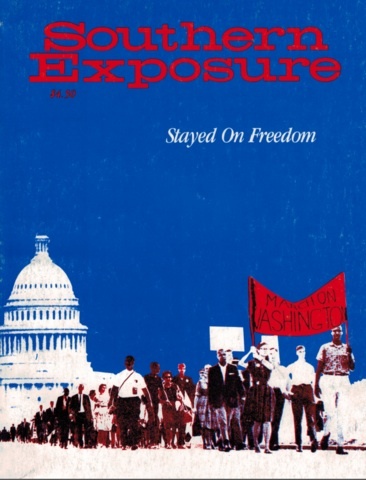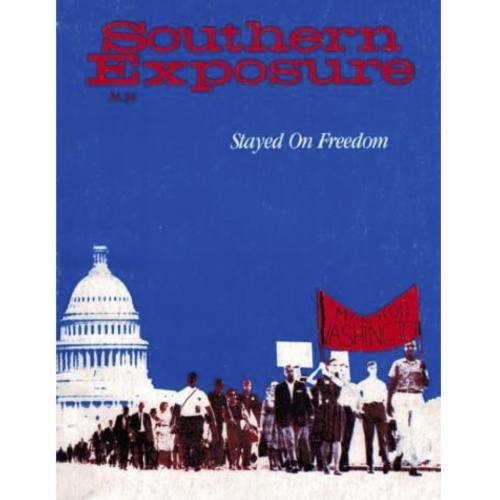From the Southern Exposure Archives: With the People

Interview with James Orange by Bob Hall
This year marks the 40th anniversary of Southern Exposure, the print magazine published by the Institute for Southern Studies, the nonprofit that also publishes Facing South. In honor of that milestone, throughout the year we will occasionally run stories from the magazine's archives. Today we share Southern Exposure founding editor Bob Hall's 1981 interview with James Orange, who organized schools in Birmingham, Ala. during the height of the civil rights movement and later went on to work as a labor organizer before passing away in 2008. Orange noted that while Dr. King, whose national holiday we celebrate this year on Jan. 21, gets a lot of media attention, we hear less about "the people who got the whippings." The interview appeared in Southern Exposure's 1981 "Stayed on Freedom" issue, available for purchase here; it also appears in Southern Exposure's special 20th anniversary edition, available here.
I got fired up one day, in the basement of the Sixteenth Street Baptist Church and got to talking. They were saying that they were having problems with the schools. I said, "Hell, you want the schools turned out, I'll turn em out!" And they said, "Okay, go do it." And, hey, I didn't know how to turn those schools out, but I had got my foot in it. That's when we got out and started turning out schools.
That was apart of SCLC's thing, to turn out schools. After I joined the staff, we probably turned out, in communities, a good 50 to 75 schools across the Southeast. We'd go directly to the students, completely close the schools up, shut them down. Those students were our troops because the parents were working. They couldn't go and march. And if they marched, they'd lose their jobs. But there was nothing for the kids to lose. That was the way we did it.
You talk to the students about being able to go into a restaurant or go into a department store and buy goods but yet they couldn't sit down at the lunch counter. You talk to the students about being able to go into the courthouse and have to see a fountain say "colored" and another fountain saying "white." And you had to get that fear out of their heads, and once you erased that, then we would march.
So they put me in charge of the students in Birmingham. I attended Parker High School, but they said Parker students just wouldn't turn out because it's a middle-class high school.
So we went down to the school, to one of the classrooms, and asked them,"Y'all wanna go march?" They said, "Yeah." And so we started walking out in the hall, singing. And we got on out and by the time we got to the door, the whole school was behind us. We marched down Eighth Avenue, down towards Sixteenth Street Baptist Church. Reverend Bevel and Andy Young and all of them, when they saw the students coming, they didn't know what to think, because that was really the largest group that they had had downtown.
One Sunday, Dr. King said that we was gonna have a march. I really wasn't committed to nonviolence, you know, but there was a little girl -- I guess she was about four or five years old in the park when the police and firemen were shooting the water. She had lost her parents and was there by herself. She walked past one of the dogs, and I just picked her up, and she said,"! wanna feed em, I wanna feed em."
I didn't know what she was saying, but Reverend Fred Shuttlesworth heard what she had cried. He got in the church that night and said James Orange was carrying this little kid, and the only thing the little kid was saying was she wanted freedom, she wanted freedom. He said, "The babies are even talking about they want freedom."
Fred Shuttlesworth was the main leader we only had one in Birmingham. Shuttlesworth had more staff folk at the Alabama Christian Movement Association, which were volunteers, than King had on the national staff of SCLC. We had a larger movement in Birmingham than there was with the Montgomery Bus Boycott. But see, the publicity went to King, it didn't come to Fred Shuttlesworth, who was out there years before Dr. King got out.
The people we hear about is Dr. King, Dr. Abernathy, Andy Young, but they were basically the leaders. The media never talks about the people who got the whippings.
If we get another leader in our lifetime, I don't foresee it being nothing but a woman. The women's movement is a movement that's long overdue. If the story is ever told, women made black folk what they are today. Like, we had Martin Luther King as a leader, but if you check out every march that he participated in or led, every movement that he had, there were women and children, not men. The men stood on the side of the street and watched us get our butts whipped and talked about how bad they was -- but they were scared. That was the way we interpreted it to the community. We told women, don't even go to bed with him if he won't stand up for you. In a couple of cities that worked. Men was coming around, saying, "Man, my wife has got me sleeping on the couch, I got to come down here and help."
All along, I had been working alongside labor folk. They're the ones who make sure a movement has leaflets, transportation, and bond money. In SCLC, we never went and organized no community, we really didn't. Now we called ourselves organizers, but we really was mobilizers. We could mobilize a community for a shotgun, like for a spur-of-the-moment movement. But in organized labor your tendency is to set up an organization, and that organization, whether I'm there or not, they know that a certain day each year, they're gonna have an election. You've got a contract to renew, a company to negotiate on an equal footing with, people who you represent day in and day out. That's the difference with labor. It focuses on economics and independent security.
I feel very strongly that in a lot of areas labor could really take up in the South where civil rights left off. But it's gonna have to be some real progressive thinking as far as the whole concept of black versus white, because you got a lot of blacks working in the South, and I think once we could show them, "Hey, that ain't just a white union, blacks are there too," then a lot of stuff can happen.
In a lot of areas poor whites are just as bad as blacks as far as the power structure is concerned. They might not do the same things, but they have the same lifestyle. Friday night, Saturday night is when they party, Sunday they go ask for blessings. You gotta teach them how to get blessings all week long. And those blessings go to everybody in the community. You find a worker that's not organized, it's a worker that's always bitching about something, either his home, his church, his school, his job, his surroundings, his community, he's the worker who's bitching. But the average worker that's organized, he's out doing something in his community. That's why I see something that could happen with labor, really, with labor and civil rights. On a national level, and in every community.
Tags
Southern Exposure
Southern Exposure is a journal that was produced by the Institute for Southern Studies, publisher of Facing South, from 1973 until 2011. It covered a broad range of political and cultural issues in the region, with a special emphasis on investigative journalism and oral history.
